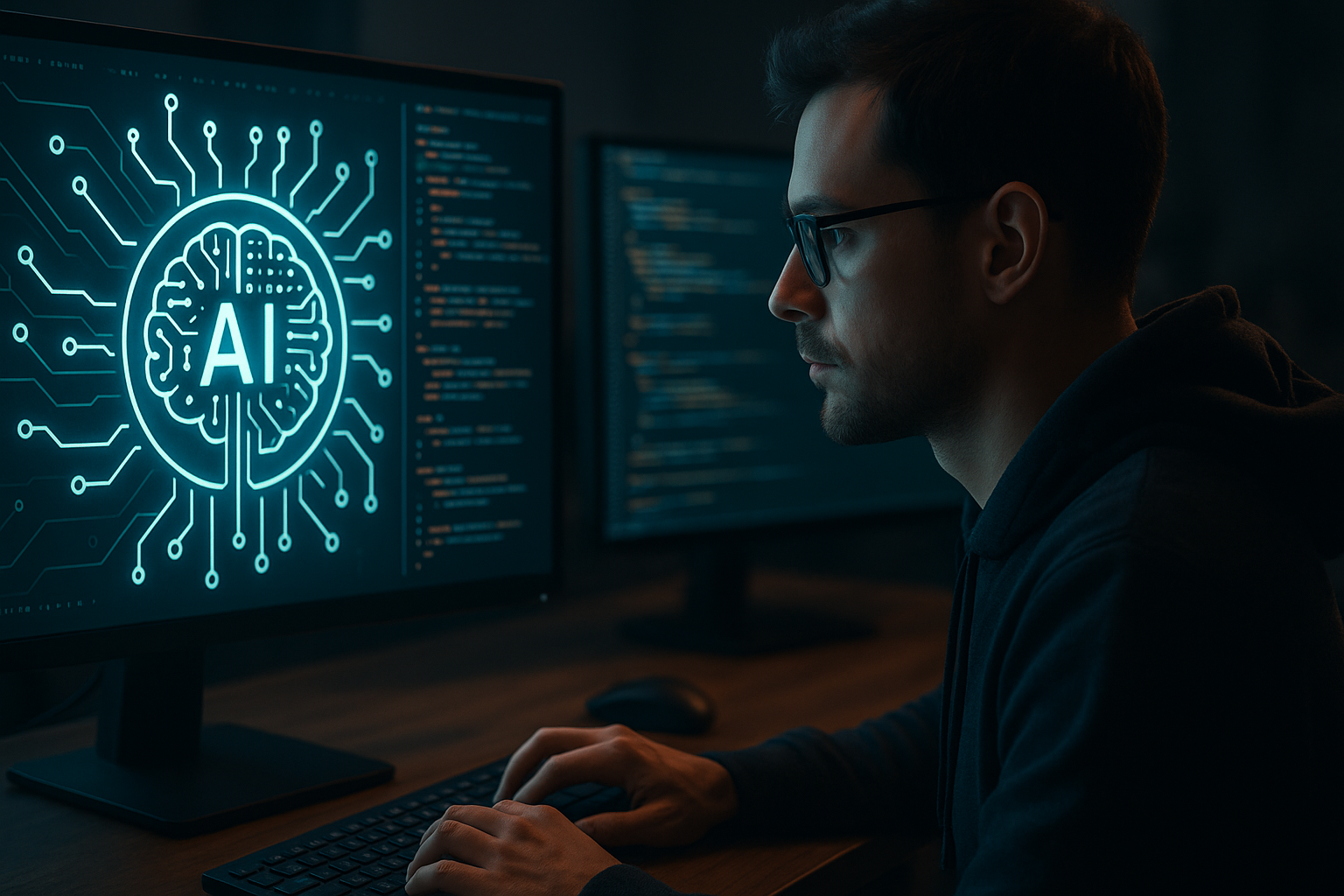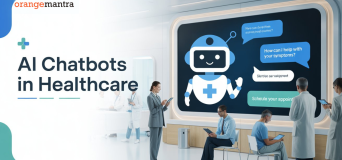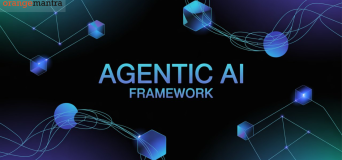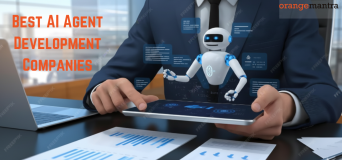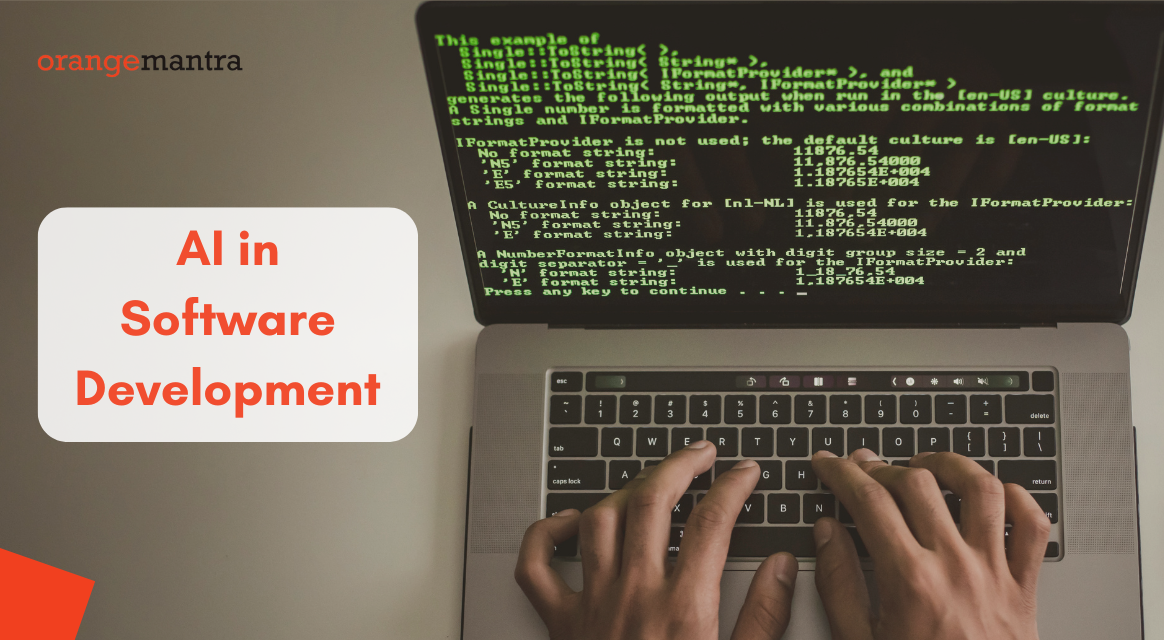
AI isn't magic—it's your new pair-programming partner. Start small, scale strategically, and focus on human-AI collaboration. The 10x productivity leap awaits.
Still, burning the midnight oil to find that 1 bug in your code? I’ve been there. Most developers have.
But the good thing is that this process can be simplified. A task that used to take you hours can be done in a few minutes.
Wondering how? By using AI in software development. In fact, many well-known companies like Google, Microsoft, IBM, Capgemini, and TCS have used it.
Mckinsey states that 95% of developers reported that generative AI positively enhanced their developer experience! Goldman Sachs states that generative AI is projected to improve global productivity growth by 1.5% and potentially increase global GDP by 7% (about $7 trillion).
Even though manual testing is important, there’s a chance that you might overlook another bug. If you use AI software to your advantage, you’ll find bugs faster and secure your software early in the development process.
Table of Contents
What is Artificial Intelligence Software?
We need to know the basics first. AI software includes tools that are used to improve the accuracy in software development and your team’s productivity. Generative AI solutions (Gen AI) and Large Language Models (LLM) are used together to streamline the entire process from start to end.
When a software engineer works with AI, it’ll convert requirements into basic explanations of the software, from the user’s perspective. This helps you in 5 ways –
- Reducing human error
- Improve team’s productivity
- Speeds up the development process
- Improves the quality of the final product.
- Allows your team to focus on complex or creative tasks.
Apart from this, GenAI is being used in DevOps. Your DevOps Connsulting services team can use AI development tools for –
- Scheduling tasks efficiently
- Allocate resources
- Monitor system performance in real time
- Optimize CI/CD pipelines
- Automate routine tasks
- Prevent potential failures
AI plays an important role in almost every industry. As AI continues to evolve, many businesses will use AI for different purposes in the upcoming years.
Mark Zuckerberg said that AI will write half of Meta’s code by 2026, and 80% of organizations will implement AI-based development tools or models. (Source: Gartner).
5 Ways How AI is Being Used in Software Development
AI tools are being used to improve the team’s overall productivity. Key areas where AI is being used for software development include:
Code Generation
AI-powered tools are helping developers generate an entire function of code. This has helped speed up the development process and made fewer errors while writing code. AI development tools can be used to predict and suggest the next lines of code.
Bug Fixing and Detection
AI tools are used to find bugs or inefficiencies in code. An AI software engineer can easily analyze these patterns and offer solutions accordingly.
Project Management
AI in software engineering also assists Project Managers in scheduling their tasks. AI can analyze historical data and provide accurate timelines.
Testing Automation
AI tools are used to generate test cases and optimize them. This reduces manual testing and helps save time and resources.
UX Design
Create user interfaces based on behavioral data by using AI development tools. AI can also:
- Personalize user experience for individual customers.
- Conduct A/B testing to know which design is performing better.
5 Benefits of Using AI in Software Development
The use of generative AI for software development offers several benefits for you and your team. Here are the top 4 advantages:
1) Automating Mundane Tasks
AI-powered tools take care of time-consuming tasks, which saves time for your developer team. This allows them to focus on tasks that require problem solving skills rather than debugging all day.
2) Improved Software Quality
AI can detect bugs and loopholes early in the development process. Fixing these bugs will speed up the development process and ensure your customers don’t run into 404 errors.
3) Quick Decision Making
AI in software engineering analyzes large datasets, which can be used to provide accurate predictions. This helps in managing your resources efficiently and using your time wisely.
4) Accessible to the non-tech team
Thanks to no code and low code, even your non-engineering team can customize AI applications. They wouldn’t need technical knowledge. That means your stakeholders and project managers can customize it according to their requirements.
5) Improved User Experience
AI in software development assists in personalizing applications in real time. It can analyze customer behavior and recommend products based on their purchase history. This helps increase customer satisfaction and engagement.
| Benefit | Technical Impact | Business Value |
|---|---|---|
| Task Automation | 70% reduction in repetitive work | $2.3M annual savings per team |
| Quality Enhancement | 60% fewer post-launch bugs | Higher customer retention (NPS +25) |
| Faster Decisions | Real-time data processing | 30% shorter product cycles |
| Democratization | Low-code/no-code platforms | 5x faster prototyping |
| UX Personalization | Behavioral analytics integration | 35% higher conversion rates |
4 Limitations of Artificial Intelligence Software Development
Despite the advantages it brings, AI software has limitations of its own. Before jumping the wagon, here are 4 challenges you should be aware of –
Bias
If the data that’s used to train AI models contains biases, the output can hurt your customers’ sentiments. Unfair biases also influence your decisions. Regularly audit the outputs to promote fairness. Bias detection tools can be used to ensure the output is equal for everyone.
Overreliance
When developers become dependent on AI for debugging and writing code, their programming skills decline. Plus, AI isn’t 100% accurate and can make mistakes. Developers should use AI in software development as an assistant tool while honing their technical skills.
Security Vulnerabilities
If you don’t look into your code, it’ll attract unwanted attention from hackers. Even though AI can detect bugs and help you secure your software, there can be loopholes. Security audits should be conducted regularly, and double-check your AI-generated code.
Lack of Transparency
Many AI models don’t provide transparency. This makes it hard to understand why certain decisions were made. Therefore, developers should use tools that easily interpret its actions and provide clarity.
3 Companies Who Used Generative AI for Software Development
Several well-known companies have used AI in software development. Here are the top 3 examples:
Infosys
One of the biggest challenges Infosys faced was unbiased data and integrating AI tools with their existing software. To solve this, their team developed an iLEAD platform for end-to-end AI-assisted software development. This solution ensured that the output was of high quality and followed compliance.
Wipro
They lacked trust in AI outputs, especially with new data. With its black box in nature, explaining the decisions it made was difficult to explain to the stakeholders. They focused on building explainable artificial intelligence software. They adopted iterative, feedback-driven development to manage expectations and improve solutions over time.
HCL Technologies
Their top concern was the unbiased output the AI software gave, and they wanted to promote fairness. To solve this, HCL technologies made tweaks to their existing solution to emphasize fairness, transparency, and compliance.
Who Can Use AI in Software Development?
Artificial intelligence software development isn’t just restricted to data science experts or developers. It’s become accessible to nontechnical individuals as well.
While skilled developers have the advantage of using code, nontechnical users can use AI through low-code platforms. These platforms have a simple user interface that doesn’t require coding to build apps or automate tasks.
By bridging this gap between the technical and the nontechnical teams, AI and software development offers a collaborative approach.
Frequently Asked Questions
Q1. What is artificial intelligence software?
It’s a process of using AI tools to make the software development process easier. Developers and many well-known companies like Wipro and Infosys use artificial intelligence software to find bugs and loopholes early in the development process.
Q2. What is software artificial intelligence used for?
They’re mainly used for conducting specific tasks, whether they are simple, repetitive, or complex. However, it needs to be trained, as its responses aren’t accurate.
Q3. Do you provide AI software development services?
Yes, we do! Our developers are skilled in AI and relevant technologies. Additionally, it can be tailored to your project requirements.
Q4. What is the future of AI in software development?
The future is bright! Many companies, including Meta, will use AI to write half their code. AI tools will also be used to deliver valuable insights and automate tasks. This allows developers to focus on other high priority tasks.
Q5. Which coding languages are used for AI software development?
There are many. Popular ones include
- Python
- Java
- C++
- Julia
